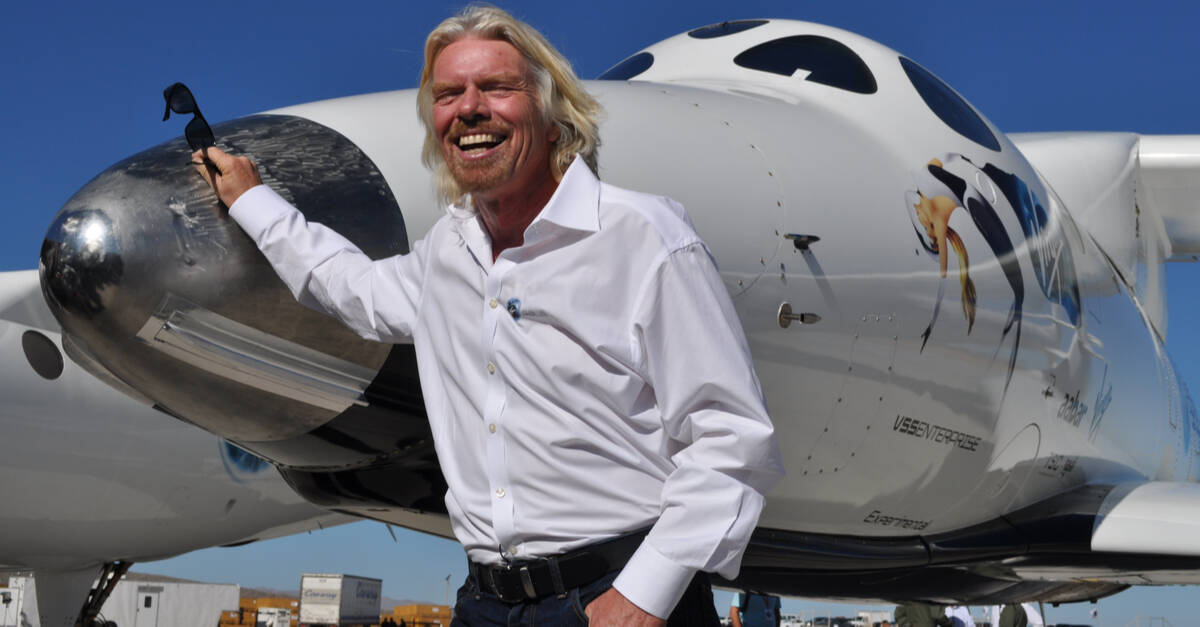
America's aviation safety officials have grounded Virgin Galactic flights after its rocket trip that took company founder Richard Branson up into the heavens for a few minutes went off course.
In July, the beardy British billionaire and his crew briefly reached an altitude of 86km (53 miles) aboard a rocket plane dubbed SpaceShipTwo aka Virgin Space Ship Unity. That took them above NASA's 80km definition of the edge of space, fulfilling Branson's ambition to go beyond Earth's atmosphere.
To get that high, their spacecraft took off attached to a large plane called Virgin MotherShip Eve, and was released at about 16km above the surface to continue rocketing on up into space. Crucially, it emerged afterwards that on return to Earth, SpaceShipTwo flew outside the airspace it was allocated.
Further SpaceShipTwo flights are on hold while the US Federal Aviation Administration (FAA) and Virgin Galactic probe the matter.
SpaceShipTwo deviated from its air traffic control clearance as it returned to Spaceport America
"The FAA is overseeing the Virgin Galactic investigation of its July 11 SpaceShipTwo mishap that occurred over Spaceport America, New Mexico," a spokesperson for the aviation watchdog told The Register.
"SpaceShipTwo deviated from its air traffic control clearance as it returned to Spaceport America. Virgin Galactic may not return the SpaceShipTwo vehicle to flight until the FAA approves the final mishap investigation report or determines the issues related to the mishap do not affect public safety."
As reported by the New Yorker, about a minute after SpaceShipTwo was released from its mothership, the pilots were warned by their cockpit systems that they were not on the trajectory required to, once the rocket finished firing, glide back to their landing point on Earth as intended. SpaceShipTwo was simply not climbing steeply enough.
The pilots had the choice of either aborting the flight before reaching space, or correcting their trajectory. They chose the latter, which caused them to leave their FAA-allotted airspace for nearly two minutes, out of a 15 minute flight, during descent.
While the magazine, citing sources, said aborting the mission would have been the best bet – delaying Branson's race into space against Amazon tycoon Jeff Bezos – Virgin Galactic insisted its pilots made the right choice after encountering strong winds at high altitude. It described the flight as "safe and successful."
"Our pilots responded appropriately to these changing flight conditions exactly as they have been trained and in strict accordance with our established procedures," Virgin Galactic said in a statement.
"Although the flight’s ultimate trajectory deviated from our initial plan, it was a controlled and intentional flight path that allowed Unity 22 to successfully reach space and land safely at our Spaceport in New Mexico. At no time were passengers and crew put in any danger as a result of this change in trajectory."
Regarding the FAA's characterization of the flight, Virgin Galactic claimed its rocket plane "did not fly outside of the lateral confines of the protected airspace.
"The flight did drop below the altitude of the airspace that is protected for Virgin Galactic missions for a short distance and time (1 minute and 41 seconds) before re-entering restricted airspace that is protected all the way to the ground for Virgin Galactic missions.
"At no time did the ship travel above any population centers or cause a hazard to the public."
Mark "Forger" Stucky, Virgin Galactic's former lead test pilot and flight-test director, had a few opinions on what went wrong that day in July. "The pilots failed to trim to achieve the proper pitch rate, the winds were well within limits," he claimed.
Stucky was, by the way, reportedly sidelined ahead of the July flight, and let go days later, after some of his criticisms of Virgin Galactic appeared in a book about the corporation written by the New Yorker article's author, Nicholas Schmidle.
Virgin Galactic shares fell slightly at the news of the ground, not that Sir Richard is too worried as he's already sold off a large chunk of his holdings in the biz. Nevertheless, his business remains the only commercial spaceflight venture to have cost a life in flight, and no doubt the FAA will go over this incident very carefully. ®
https://news.google.com/__i/rss/rd/articles/CBMiQGh0dHBzOi8vd3d3LnRoZXJlZ2lzdGVyLmNvbS8yMDIxLzA5LzAzL3Zpcmdpbl9nYWxhY3RpY19ncm91bmRlZC_SAURodHRwczovL3d3dy50aGVyZWdpc3Rlci5jb20vQU1QLzIwMjEvMDkvMDMvdmlyZ2luX2dhbGFjdGljX2dyb3VuZGVkLw?oc=5
2021-09-03 06:02:00Z
52781854406817
Tidak ada komentar:
Posting Komentar